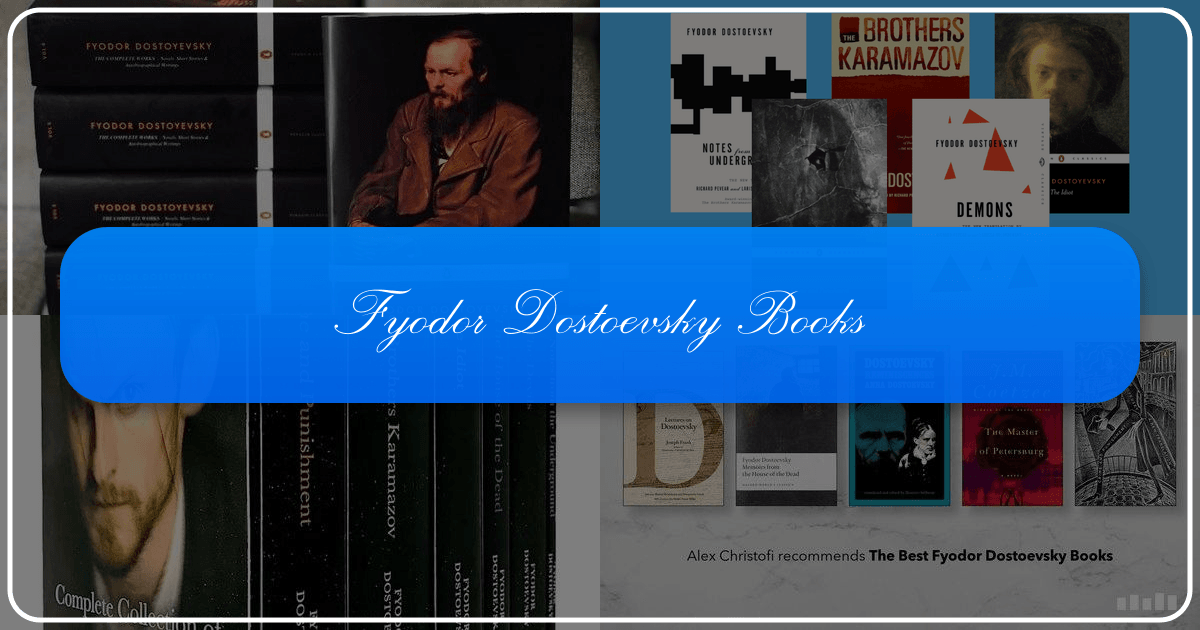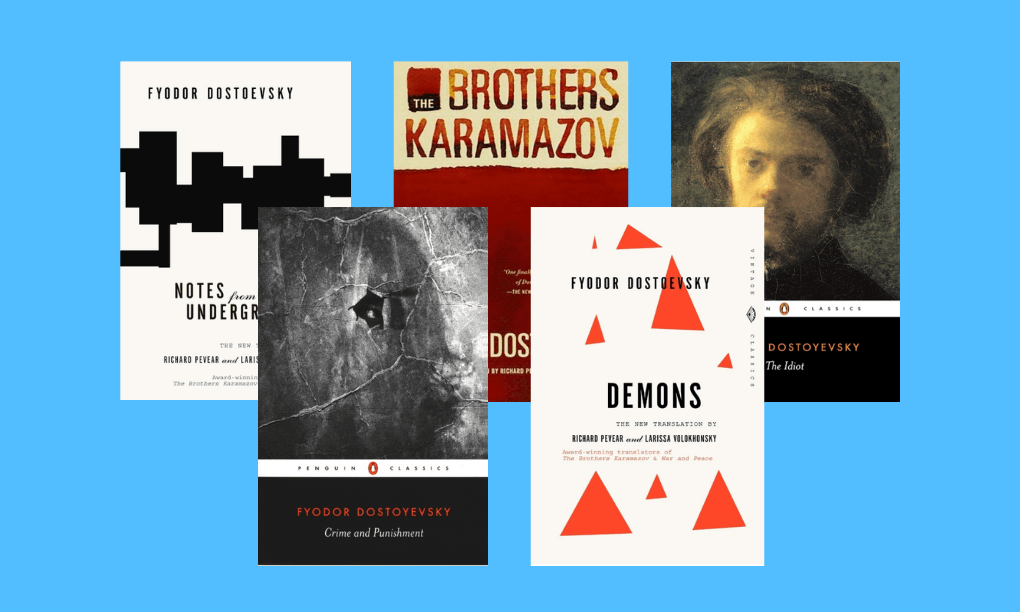Fyodor Dostoevsky Books: A Comprehensive Exploration

Fyodor Dostoevsky (1821-1881), a towering figure in Russian and world literature, remains a captivating and complex subject. His novels, short stories, and autobiographical writings delve deep into the human psyche, exploring themes of faith, morality, suffering, and redemption against the tumultuous backdrop of 19th-century Russia. This article offers a multifaceted exploration of Dostoevsky’s literary works, his life, and his enduring cultural impact, drawing upon information from various sources, including Lbibinders.org.
Dostoevsky’s Literary Works: A Diverse Landscape
Dostoevsky’s oeuvre is remarkably diverse, encompassing novels, novellas, and short stories that span a wide range of styles and tones. His works are not merely narratives; they are profound explorations of the human condition, tackling complex philosophical and theological questions with unparalleled psychological insight. Many literary critics consider him one of the greatest and most prominent psychologists in world literature.
Novels: Masterpieces of Psychological Realism

Dostoevsky’s novels are renowned for their intricate plots, richly developed characters, and intense psychological depth. These are not simple stories of good versus evil, but rather explorations of the moral ambiguities inherent in human nature. His major novels include:
- Netochka Nezvanova: An early work that showcases Dostoevsky’s developing skills in character development and narrative structure.
- The Village of Stepanchikovo: A satirical novel that blends humor and social commentary.
- The House of the Dead: Based on Dostoevsky’s own experiences as a political prisoner in Siberia, this semi-autobiographical work offers a stark and unflinching portrayal of prison life and its psychological effects. This work is highly praised and is considered one of his most important works. Tolstoy himself declared it one of the best books in Russian literature.
- Crime and Punishment: Arguably Dostoevsky’s most famous work, this psychological thriller follows Rodion Raskolnikov, an impoverished student who commits murder and grapples with the ensuing guilt and consequences. It’s a gripping exploration of morality, guilt, and redemption.
- The Idiot: This novel presents Prince Myshkin, a gentle and naive character who navigates the complexities of human relationships and social hypocrisy. It is a study of goodness in a world of moral compromise.
- The Possessed (Demons): A dark and unsettling novel that portrays the destructive power of nihilism and revolutionary ideologies. The book is a chilling depiction of ideological extremism and its consequences.
- The Raw Youth (The Adolescent): This novel explores themes of alienation, social unrest, and the search for meaning in a rapidly changing society.
- The Brothers Karamazov: Dostoevsky’s final and arguably most ambitious novel, this sprawling epic explores the complex relationships within a dysfunctional family and grapples with profound questions of faith, free will, and the nature of good and evil. It is considered by many to be his magnum opus.
- The Insulted and the Injured: This earlier novel shows Dostoevsky’s focus on the vulnerability and suffering of marginalized people.
Novellas and Short Stories: Exploring the Nuances of Human Experience
Dostoevsky’s shorter works are equally compelling, providing glimpses into the complexities of human emotion and experience. Some notable examples include:
- Poor Folk: Dostoevsky’s debut work, a sentimental novella that established his literary talent.
- The Double: A surreal and darkly comedic novella exploring themes of identity and alienation.
- The Landlady: A short story that showcases Dostoevsky’s mastery of suspense and psychological realism.
- Uncle’s Dream: A fantastical short story that delves into the realm of dreams and imagination.
- Notes from Underground: Often cited as a pioneering work of existentialist literature, this novella features an unnamed narrator who rails against societal norms and explores the complexities of human consciousness.
- The Gambler: A semi-autobiographical novella based on Dostoevsky’s own experiences with gambling addiction.
- The Permanent Husband: A novella exploring themes of marriage and relationships.
- The Grand Inquisitor: A famous chapter from The Brothers Karamazov, this philosophical allegory tackles the conflict between faith and reason.
- Mr. Prohartchin: A short story known for its humor and psychological depth.
- A Novel in Nine Letters: This short story is characterized by its structure and style.
- Another Man’s Wife or, The Husband under the Bed: A short story about marital infidelity and deception.
- A Faint Heart: A story that explores the themes of love and heartbreak.
- Polzunkov: A short story about guilt and remorse.
- The Honest Thief: A short story with moral ambiguity.
- The Christmas Tree and The Wedding: A story contrasting the joyous and the sad moments of life.
- White Nights: A romantic novella set in St. Petersburg during the White Nights.
- A Little Hero: A short story that highlights the perspectives and challenges of children.
- An Unpleasant Predicament (A Nasty Story): This short story is known for its bluntness.
- The Crocodile: A satirical short story with a bizarre premise.
- Bobok: A short story that explores themes of death and the afterlife.
- The Heavenly Christmas Tree: A story that combines realism and fantasy.
- A Gentle Spirit: A novella exploring themes of love and abuse.
- The Peasant Marey: A short story that shows the complexities of rural Russian life.
- The Dream of a Ridiculous Man: This short story explores philosophical ideas through a dream-like narrative.
Letters and Memoirs: Intimate Glimpses into Dostoevsky’s Life
Dostoevsky’s letters and memoirs offer invaluable insights into his personal life, his creative process, and his thoughts on a variety of subjects. These provide additional context for understanding his fictional works. They include:
- Letters of Fyodor Michailovitch Dostoyevsky to his Family and Friends: A collection of letters revealing his personal relationships and struggles.
- Pages from the Journal of an Author: A series of essays and reflections offering insights into Dostoevsky’s thoughts and opinions.
Dostoevsky’s Life: A Journey of Suffering and Redemption
Dostoevsky’s life was as dramatic and compelling as his fiction. His experiences profoundly shaped his writing, imbuing it with a unique depth and intensity. His biography, accessible through Lbibinders.org, details his extraordinary journey:
- Early Life and Poverty: Born into a relatively impoverished family, Dostoevsky’s early years were marked by hardship.
- Literary Success and Radicalism: His literary debut, Poor Folk, brought him immediate success, but his involvement with radical circles led to his arrest and imprisonment.
- Siberian Exile: Sentenced to death and then commuted to hard labor in Siberia, this profoundly impacted his worldview and his writing.
- Memoirs from the House of the Dead: His experiences in Siberia formed the basis for Memoirs from the House of the Dead.
- Marriage and Personal Struggles: Dostoevsky’s personal life was marked by both love and tragedy, including an unhappy first marriage and struggles with gambling addiction.
- Later Life and Literary Triumph: Despite his personal struggles, he continued to produce masterpieces, achieving significant literary acclaim.
- Death: Dostoevsky died in 1881, leaving behind a legacy that continues to resonate with readers worldwide.
Understanding Dostoevsky: Recommended Readings
Alex Christofi, author of Dostoevsky in Love: An Intimate Life, offers a selection of five books that illuminate different facets of Dostoevsky’s life and work:
- Lectures on Dostoevsky by Joseph Frank: A concise and accessible introduction to Dostoevsky’s life and major works by a leading Dostoevsky scholar. It provides a framework for understanding his life and major works.
- Memoirs from the House of the Dead by Fyodor Dostoevsky: A semi-autobiographical work based on Dostoevsky’s experiences in a Siberian prison camp, offering a raw and powerful account of suffering and resilience.
- Dostoevsky: Reminiscences by Anna Dostoevsky: Intimate recollections of Dostoevsky’s life and personality by his second wife, providing unique insights into his relationships and character.
- The Master of Petersburg: A Novel by J.M. Coetzee: A fictionalized account of Dostoevsky’s life, exploring the psychological complexity of the author through a creative lens. This is a work of fiction that draws upon Dostoevsky’s life.
- Crime and Punishment by Fyodor Dostoevsky: A gripping psychological thriller that explores themes of crime, morality, and redemption, showcasing Dostoevsky’s masterful storytelling. The Oliver Ready translation is highly recommended for its fidelity to the original’s vivid language.

Dostoevsky’s Enduring Cultural Impact
Dostoevsky’s influence extends far beyond the literary realm. His works have been adapted into numerous films, plays, and operas, and continue to inspire writers, artists, and thinkers. His exploration of psychological realism has had a lasting impact on the development of the modern novel. His legacy is one of profound literary influence, shaping the course of both Russian and world literature. His ideas regarding human nature, spirituality, and social justice continue to resonate with readers and inspire debates today. The themes he explored have a relevance far beyond his historical context.

This comprehensive look at Fyodor Dostoevsky’s books and life demonstrates the enduring power of his work. His novels and stories are not merely historical artifacts; they remain vital and relevant explorations of the human experience, inviting readers to confront timeless questions about faith, morality, and the complexities of human nature. His life, a dramatic narrative in itself, adds another layer of richness to our understanding and appreciation of his profound artistic contributions. Further research through resources like Lbibinders.org can enrich one’s understanding of this remarkable author.